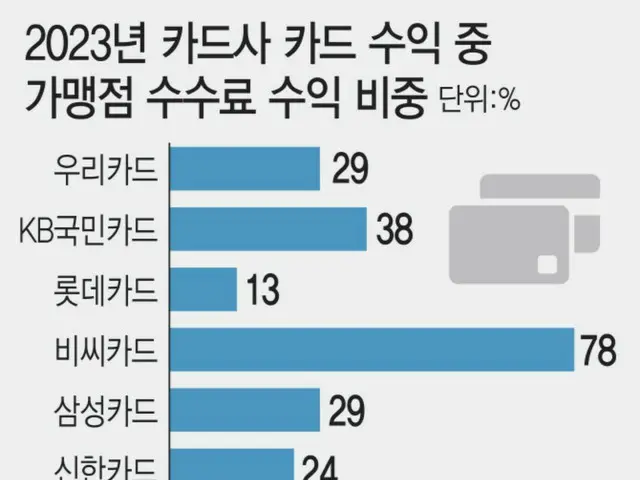- finally declared a boycott of Lotte Card due to the high merchant fees and the refusal to even negotiate the fees. Small and medium-sized supermarkets regarding card fees
The friction between Lotte Card and Lotte Card is intensifying, and there is growing interest in whether member stores will cancel their contracts more widely. According to the Korea Mart Association, the annual sales amounted to 3 billion won (approximately 338 million yen) from the 3rd to the 1st.
The so-called ``Lotte Card boycott,'' in which small and medium-sized supermarkets across South Korea are canceling their Lotte Card member store contracts, is expanding. You can use Lotte Card at the supermarket where you canceled your franchise contract.
payment cannot be made. Lotte Card charges an average fee of 2.13% for general merchants, which is the second highest fee after BC Card (2.15%). However, BC
The Korea Mart Association claims that Lotte Card has a high rate of debit card usage, and that Lotte Card receives the largest amount of credit card fees. NH agricultural cooperative card
The average fee rate is 1.98%, Shinhan Card and Hyundai Card have an average fee rate of 2.04%, and Kookmin Card has an average fee rate of 2.06%.
Hong Chun-ho, director of the Korea Mart Association, said, ``In 2010, credit card payments were around 50%.
Currently, 95% of credit card customers are paying credit card fees, and the burden of credit card fees is becoming a heavy burden.
"The current situation is that the rent exceeds the rent." In particular, small and medium-sized supermarkets claim that they are unable to negotiate fees with credit card companies. Director Hong said, ``At small and medium-sized supermarkets,
When I called Lotte Card to negotiate the fee, I was simply told that I would pass it on to the staff in charge, and in fact they would not accept the call."
"We have submitted a power of attorney requesting that credit card companies negotiate with us, but it is difficult because the system does not guarantee general member stores the right to negotiate with credit card companies."
This is not the first time there has been friction between credit card companies and general merchants over fees. Shinhan Card will be a hassle in 2022
The government has declared that it will raise the fee rate by more than 0.2 percentage points, from 2.02% to 2.28%, but small and medium-sized supermarkets are refusing to do so. The root cause of this repeated friction over card member store fees is
Some have pointed out that this is a flaw in the system. Merchant fees, which are the main source of revenue for card companies, are calculated and adjusted by the Financial Services Commission every three years based on the “qualified expenses” that form the basis of the fee rate.
In particular, the influence of the political world was significant during this process, and the commission fee for franchisees with annual sales of 3 billion won or less was reduced 14 times from 2007 to 2013 with each recalculation of eligible expenses.
Currently, the card industry is unable to make a profit from its core business due to merchant commission rates in the 0% range. In 2007, merchant commission rates reached 4.5% of the transaction amount, but are now in the 0% range.
The number of affiliated stores eligible for the preferential fee treatment will be 96% of the total 3 million affiliated stores. In fact, as of last year, the percentage of affiliated store fees in Lotte Card's card revenue was
The percentage of card companies that do not have a profit from merchant fees is only 13%, which is the lowest level among the eight card companies.
The situation is not leading to profits. Friction over fees is expected to intensify this year as the three-year period for recalculating eligible expenses is due. The Financial Services Commission unilaterally determines commission rates.
This is because unlike affiliated stores with annual sales of 3 billion won or less, general affiliated stores with annual sales of 3 billion won or more negotiate fees individually.
Professor Seo JIYEON of the Department of Business Administration at Sangmyeong University said, ``Annual sales are 10 billion won.''
``Large member stores such as telecommunications companies, automobile companies, and large supermarkets, which sell more than 1.12 billion yen (approx.
``It is natural for regular Una franchisees to be dissatisfied with the system's flaws, as they do not even have the opportunity to negotiate.'' Furthermore, Professor Seo said, ``Currently, the commission rate determination system itself is subject to market participants.''
``The system needs to be improved to allow merchants to determine their fees based on their sales contribution, and to protect small merchants by raising their fees and setting an upper limit.''
I'm emphasizing it.
2024/04/04 07:09 KST
Copyrights(C) Edaily wowkorea.jp 107

